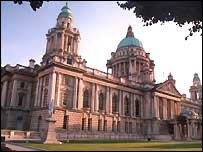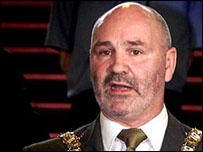|
By Mark Devenport
BBC Northern Ireland political editor
|

The biggest shake up in Northern Ireland's local government for three decades is to be announced by Secretary of State Peter Hain next week.

Secretary of State Peter Hain is set to announce the shake-up
|
The Review of Public Administration (RPA) was set up by the old power-sharing government at Stormont to examine the various layers of bureaucracy that deal with health, education and council services.
Now it's decision time, and there's growing expectation that ministers will replace Northern Ireland's current 26 district councils with seven super councils.
The current council structure dates back to 1973 when ministers implemented the recommendations of a report from Sir Patrick Macrory.
A plethora of urban, rural and county councils and corporations which had administered local government in Northern Ireland were replaced by 26 city, borough and district councils.
The team in charge of the latest RPA favours cutting that number to just seven.
It's understood the preferred option is to retain Belfast City Council more or less as it currently exists. But the rest of Northern Ireland would be divided into six council areas.

It's understood the preferred option is to retain Belfast City Council
|
In the east, there will be a greater Down council and a greater Antrim council, as well as a council covering an outer ring around Belfast stretching from Lisburn to Carrickfergus.
In the west, there will also be three councils with roughly similar population sizes. But because people are more thinly spread on the ground west of the River Bann, the geographic areas of the councils is much bigger.
There's a greater Derry council taking in Strabane and Limavady, a big western council stretching from Fermanagh to Cookstown and then a southern council taking in Newry and Craigavon.
These councils are due to be in place for elections scheduled for May 2009.
Alongside these new councils the bodies which control health and education are due to be revamped.
It's thought the present four health boards and 18 health trusts could be transformed into five agencies, whilst a single authority might replace the current five education boards.

Alex Maskey believes the seven council model will deliver savings
|
The team behind the review believes this streamlining could save as much as �150m to �230m a year.
However, the DUP's Peter Weir is not convinced by those figures. Currently, the president of the Northern Ireland Local Government Association (NILGA), he points out that services will have to be provided to ratepayers no matter how many councils are retained.
Mr Weir also argues that the super councils will be too remote and not sufficiently responsive to local communities.
Moreover, given that the three councils in the east will have unionist majorities, whilst their three western counterparts will be nationalist, the NILGA president reckons the proposal is a recipe for a "sectarian carve-up".
Councils
NILGA favours 15 councils, and that position is endorsed by the DUP, the Ulster Unionists, the SDLP and Alliance.
However, one major party, Sinn Fein, disagrees. Its first Belfast Mayor, Alex Maskey, believes the seven council model will deliver savings to ratepayers and will guarantee an equal rates burden across Northern Ireland.
He also says the new structure will ensure minority rights because in each area the minority community, be it nationalist or unionist, will constitute at least 25% of the population.
Mr Maskey says his party only supports the shake-up in the context of the restoration of the Stormont Assembly and Executive and proper safeguards to ensure power is shared democratically at a local level.
The current councils are limited in their functions to services like collecting waste, controlling dogs, and maintaining parks and cemeteries.
The new super councils are expected to get extra responsibilities in areas like planning and local roads.
They could expand their expenditure from less than 5% of the Northern Ireland budget to more like 10%, but this shake-up will inevitably raise questions about whether there is room for improvement in those other arms of government like the Stormont departments which account for the vast majority of official expenditure.


